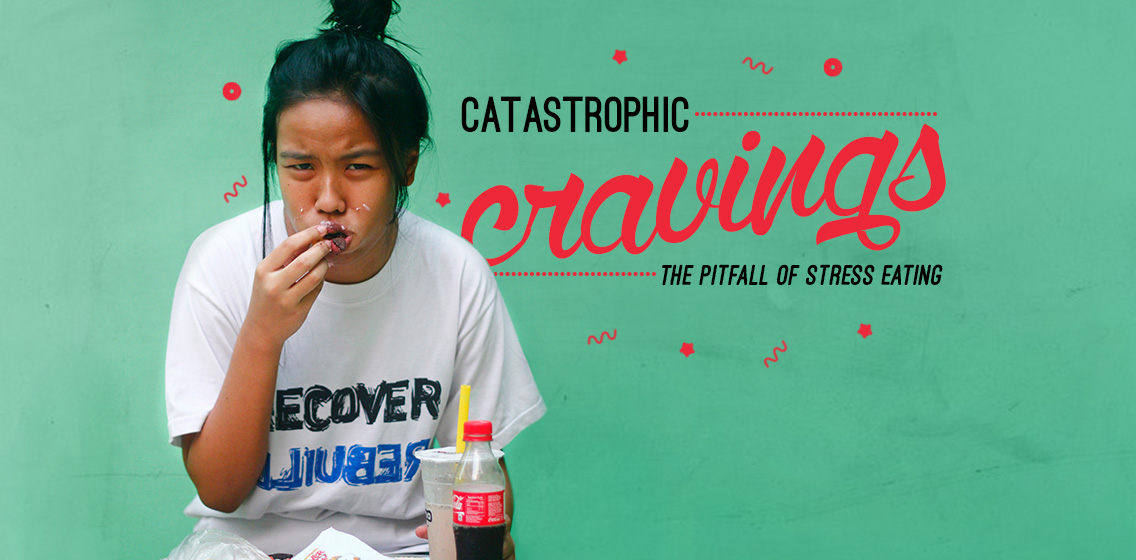Scrounger’s land
0 comments
Infographic by Mikhaela Torres If there’s one peculiar thing that has irked the Filipinos for generations, it would probably be flying
Admin improves online enrollment for second sem
Photo by Patricia Loise Lucero The use of a high-end test server, additional bandwidth, and the new Provisional Telephone Hotline are
Catastrophic cravings
 Photos by Jose Mari Martinada and Moesha de Guia
Photos by Jose Mari Martinada and Moesha de Guia
 Uncontrollable pig outs
During stressful times, accessible food places are quickly filled with fatigued students. It has become a dragging habit of ours to find comfort in food, and after a long period of time, we tend to do it without full awareness. This recurring habit is described as unconscious eating by Dr. Jennifer Kromberg in her article Emotional Eating? 5 Reasons You Can’t Stop. When our mind is fixated about certain things, our unconscious mind uses sensory inputs, old memories, and emotions to take control over our body and convince ourselves that eating would be a great idea, as stated in the article Your Unconscious Mind is Making You Fat published by Health Habits.
Unconscious eating was further elaborated by Dr. Gina Scarano-Osika, author of the book Friendly Mirrors and Contented Closets. During this phase, our mind actually experiences a blankness caused by our mind’s preoccupation. This in turn leads stress eaters to be unmindful of their food intake. The temporary mental block associated with overeating may lead to other serious health-related problems like obesity, high blood pressure, and digestive problems.
Stress eating can build up a strong connection with our mind and body; and as a consequence, the nasty effects of these habits could stay in our system. Constant effort to be mindful of the food that we are consuming can be the key to end this practice and to squeeze healthy eating habits in our system.
Uncontrollable pig outs
During stressful times, accessible food places are quickly filled with fatigued students. It has become a dragging habit of ours to find comfort in food, and after a long period of time, we tend to do it without full awareness. This recurring habit is described as unconscious eating by Dr. Jennifer Kromberg in her article Emotional Eating? 5 Reasons You Can’t Stop. When our mind is fixated about certain things, our unconscious mind uses sensory inputs, old memories, and emotions to take control over our body and convince ourselves that eating would be a great idea, as stated in the article Your Unconscious Mind is Making You Fat published by Health Habits.
Unconscious eating was further elaborated by Dr. Gina Scarano-Osika, author of the book Friendly Mirrors and Contented Closets. During this phase, our mind actually experiences a blankness caused by our mind’s preoccupation. This in turn leads stress eaters to be unmindful of their food intake. The temporary mental block associated with overeating may lead to other serious health-related problems like obesity, high blood pressure, and digestive problems.
Stress eating can build up a strong connection with our mind and body; and as a consequence, the nasty effects of these habits could stay in our system. Constant effort to be mindful of the food that we are consuming can be the key to end this practice and to squeeze healthy eating habits in our system.
 Metamorphosed appetite
Skyrocketing levels of stress can fire up the alteration of students’ food preferences. Due to stress, people are tempted to consume food with high levels of sugar and fat content because of the ecstatic feeling delivered by these types of comfort food. These kinds of food release opioids, an active ingredient in narcotics.
Opioid, a medication that is widely used as a pain reliever, works by binding to opioid receptors in the brain, spinal cord, and other areas of the body. According to Food Addiction Institute, the chemical interrupts the sending of pain sensations to the brain, thus making these eye candy meals the top priority from the food menu. The calming effect brought by satisfying comfort food cravings can counteract stress, which can act as an invisible hand to push people to continue with overindulgence.
Overcoming the effects of stress eating and breaking these habits are somewhat comparable to kicking a drug addiction. Although food has contributed in overcoming stress, we should seek other solutions and possibilities that are less self-destructive to fight off stress.
Metamorphosed appetite
Skyrocketing levels of stress can fire up the alteration of students’ food preferences. Due to stress, people are tempted to consume food with high levels of sugar and fat content because of the ecstatic feeling delivered by these types of comfort food. These kinds of food release opioids, an active ingredient in narcotics.
Opioid, a medication that is widely used as a pain reliever, works by binding to opioid receptors in the brain, spinal cord, and other areas of the body. According to Food Addiction Institute, the chemical interrupts the sending of pain sensations to the brain, thus making these eye candy meals the top priority from the food menu. The calming effect brought by satisfying comfort food cravings can counteract stress, which can act as an invisible hand to push people to continue with overindulgence.
Overcoming the effects of stress eating and breaking these habits are somewhat comparable to kicking a drug addiction. Although food has contributed in overcoming stress, we should seek other solutions and possibilities that are less self-destructive to fight off stress.
 Escapism exposed by gender
Besides unawareness, gender might be a factor to the mystery of why students fight stress-induced hunger with eating. According to the American Psychological Association, men and women have different tolerances when it comes to handling stress, both physically and mentally.
Although they have the same stress levels, women are more likely to report having a great deal of stress than men—think 28 percent versus 20 percent. The findings associate women to stress and emotional eating more closely, implying that men may actually utilize a different and possibly more efficient mechanism to fight off stress.
Although women use food more often as a guard against stress compared to their counterpart, this does not limit them to other mechanisms that could be healthier and more efficient than stress eating. The choice and preferences we make as students to easily terminate these cravings should not be restricted and dictated by factors like gender.
Escapism exposed by gender
Besides unawareness, gender might be a factor to the mystery of why students fight stress-induced hunger with eating. According to the American Psychological Association, men and women have different tolerances when it comes to handling stress, both physically and mentally.
Although they have the same stress levels, women are more likely to report having a great deal of stress than men—think 28 percent versus 20 percent. The findings associate women to stress and emotional eating more closely, implying that men may actually utilize a different and possibly more efficient mechanism to fight off stress.
Although women use food more often as a guard against stress compared to their counterpart, this does not limit them to other mechanisms that could be healthier and more efficient than stress eating. The choice and preferences we make as students to easily terminate these cravings should not be restricted and dictated by factors like gender.
 Emergency exit
During the storm of deadlines and examinations, students tend to be equipped with low tolerance against stress. Without the ability to fight off and tolerate these challenges, we have created an easier excuse to be susceptible to compulsive eating. Such obsession with immediate gratifications has lead us to have a low frustration tolerance.
A concept developed by psychologist Albert Ellis, low frustration-tolerance (LFT) arises from believing that frustration is unbearable and therefore must be avoided at all costs. LFT has been the reason for our obsession with instant fulfillment and the ignorance of the aftereffect of immediate pleasures. Since students are afraid to face the challenge, the most typical action is to use food to guard ourselves from the undesirable events administered by stress.
Indulging in your comfort food is clearly more satisfying than to be depressed with burdensome problems, like exams and pending deadlines. But we must learn how to clear our minds even without the aid of food. This might be a hard habit to break but being able to take control of the situation can take away the power of food as your stress reliever.
Emergency exit
During the storm of deadlines and examinations, students tend to be equipped with low tolerance against stress. Without the ability to fight off and tolerate these challenges, we have created an easier excuse to be susceptible to compulsive eating. Such obsession with immediate gratifications has lead us to have a low frustration tolerance.
A concept developed by psychologist Albert Ellis, low frustration-tolerance (LFT) arises from believing that frustration is unbearable and therefore must be avoided at all costs. LFT has been the reason for our obsession with instant fulfillment and the ignorance of the aftereffect of immediate pleasures. Since students are afraid to face the challenge, the most typical action is to use food to guard ourselves from the undesirable events administered by stress.
Indulging in your comfort food is clearly more satisfying than to be depressed with burdensome problems, like exams and pending deadlines. But we must learn how to clear our minds even without the aid of food. This might be a hard habit to break but being able to take control of the situation can take away the power of food as your stress reliever.
 Physical susceptibility
When you are stressed out, chances are your body is experiencing deprivation as well. Allowing yourself to experience this deprivation paves our way to try to seek for comfort. This physiological effect of stress weakens the body’s guard against emotional eating to satisfy physical needs.
According to Dr. Jennifer Kromberg in her Psychology Today article, when people are hungry and tired, the body sends out signals to the brain to consume food. Our tired body gives us zero control over these urges to fight off cravings. This tears down the walls against emotional eating and makes us vulnerable to the thought that food is the only form of pleasure we need. Adam Drewnowski, a professor at University of Washington, explained that to discourage these cravings, the best option is to de-stress yourself with other remedies like listening to your favorite band or having longer hours of sleep.
When experiencing physical exhaustion, we fail to think critically towards the responses that we make. The emotional response can bring a temporary relief to our distress but remembering that your body is unlike robots and using your energy in moderation can be a big help to reduce the problem that stress eating can create.
***
Emotional eating has provided us with instant gratification but its temporary benefits only overindulge our pleasure-loving tendencies. Nevertheless, the cycle of these hunger and urges of stress eating can finally be quenched. Although there is no universal solution to reduce the stress caused by university life, each student has the freedom to explore different ways to fight stress and anxiety.
Physical susceptibility
When you are stressed out, chances are your body is experiencing deprivation as well. Allowing yourself to experience this deprivation paves our way to try to seek for comfort. This physiological effect of stress weakens the body’s guard against emotional eating to satisfy physical needs.
According to Dr. Jennifer Kromberg in her Psychology Today article, when people are hungry and tired, the body sends out signals to the brain to consume food. Our tired body gives us zero control over these urges to fight off cravings. This tears down the walls against emotional eating and makes us vulnerable to the thought that food is the only form of pleasure we need. Adam Drewnowski, a professor at University of Washington, explained that to discourage these cravings, the best option is to de-stress yourself with other remedies like listening to your favorite band or having longer hours of sleep.
When experiencing physical exhaustion, we fail to think critically towards the responses that we make. The emotional response can bring a temporary relief to our distress but remembering that your body is unlike robots and using your energy in moderation can be a big help to reduce the problem that stress eating can create.
***
Emotional eating has provided us with instant gratification but its temporary benefits only overindulge our pleasure-loving tendencies. Nevertheless, the cycle of these hunger and urges of stress eating can finally be quenched. Although there is no universal solution to reduce the stress caused by university life, each student has the freedom to explore different ways to fight stress and anxiety.





